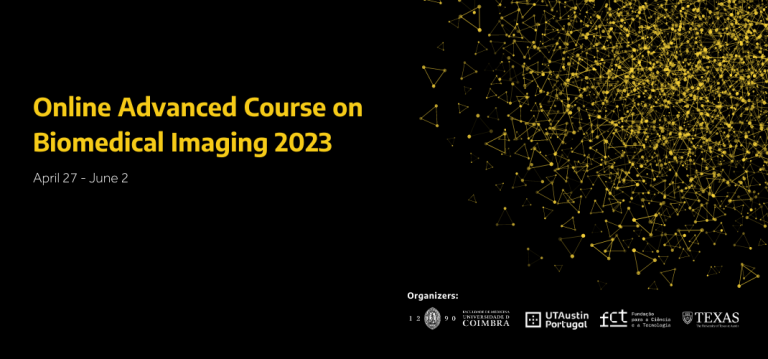
Overview
After a successful first edition in 2022, the Faculty of Medicine of the University of Coimbra in collaboration with the UT Austin Portugal Program will be organizing the 2023 edition of the Online Advanced Course on Biomedical Imaging, running on Thursdays and Fridays from April 27 to June 2 in a total of 60 hours.
The course offers a unique opportunity to learn from leading experts in Portugal, Texas (The University of Texas at Austin, through the MD Anderson Cancer Center, the School of Information and the Dell Medical School) and Germany (German Cancer Research Center) about topics intersecting with the course’s broader theme.
Additionally, it may grant you 10 ECTS credit units at the University of Coimbra if you comply with attendance and evaluation requirements. Learn more about this below. Admission to the course is free of charge unless you decide to go through the evaluation procedure to be awarded ECTS credits.
Agenda
Download the course agenda for a detailed view of the sessions and experts involved. The course is divided by 12 sessions.
Sessions and main topics
- April 27: Methods of microscopic imaging, Confocal and Electronic microscopy
- April 28: Conventional and Interventional Radiology and Mammography
- May 4: Optical Coherence Tomography and Optical Imaging
- May 5: Computed Tomography (CT) and Ultrasonography
- May 11: Nuclear Medicine
- May 12: UT MD Anderson Cancer Center Session on PET
- May 18: Nuclear Magnetic Resonance (RMN) spectroscopy
- May 19: Magnetic Resonance Imaging (MRI)
- May 25: Pre-clinical systems
- May 26: Radiotherapy, Hadrontherapy, target organs delineation and SEMINAR: New methods in Radiotherapy: MR-guided
- June 1: Artificial intelligence and data extraction in biomedical images
- June 2: UT MD Anderson Cancer Center, German Cancer Research Center and Presentation of UT Austin Portugal Projects – Session on Proton Therapy
- June 16: Evaluation (only for those who wish to obtain ECTS credits)
Kindly note that some sessions will be entirely conducted in Portuguese and others in English. You may find this information on the agenda too.
Session’s Playlist
Navigate through our playlist and (re)watch the 12 interesting sessions, which cover a broad spectrum of topics related to biomedical imaging!
Frequently Asked Questions
Click on the question on the left hand side of the table to get the detailed explanation.
Specifically designed for pregraduate and postgraduate students, healthcare professionals, biomedical engineers, physical engineers, physicists, researchers, medical residents, medical oncologists, nurses and medical imaging and radiotherapy technologists, this online course will give you a comprehensive overview of the main imaging methodologies used in biomedicine. To this end, the course scientific coordinators have invited a panel of more than 30 high calibre experts from Portugal, Texas and Germany to deliver a set of talks organized into thematic sessions.
The main physical principles and methodologies used in biomedical imaging techniques, such as data processing coming from morphological (Proton Therapy, CT, MRI, US/Doppler) or functional (SPECT, PET, Optical) approaches, including multi-modality systems will be analyzed. The basics of image formation, detection and measurement, sources of noise and artefacts, corrections, data and image processing and analysis, state-of-the-art and expected future developments will be presented and discussed.
Sessions are organized to provide room for discussion between experts and the audience, thereby encouraging the exchange of views, experiences and know-how. The brainstorming around new research ideas may also trigger the development of new research projects under the Program’s funding sources or others.
The Advanced Course on Biomedical Imaging intends to:
- give a general overview of the main imaging methodologies used in biomedicine;
- provide knowledge for the understanding of the fundamentals of biomedical imaging techniques, from physical principles to clinical applications;
- explore the potential of biomedical imaging as an essential tool to study biological systems in research environments;
- discuss the challenges of biomedical imaging in clinical environment;
- address the expected future developments.
Regardless of whether you are looking to earn 10 ECTS credits or not, you must always register first through this form. To be eligible for such credits, you will be required to complete your registration at the University of Coimbra only after being admitted by UT Austin Portugal for attendance at the online sessions.
Registrations are open until April 21.
No, you are not, unless you are looking to earn 10 ECTS credits granted by the University of Coimbra.
If you do not wish to claim ECTS credits, you can just pick the sessions that are more aligned with your learning goals and needs. However, we advise you to register for all the sessions if your goal is to improve your knowledge of the course’s underlying theme.
Full attendance will grant you 10 ECTS credits, issued by the University of Coimbra. Unlike other attendants, you will be subject to evaluation at the end of the course. This evaluation procedure will take place on the 16th of June, the only session taking place at the premises of the Biophysics Institute, iCBR, Faculty of Medicine of the University of Coimbra.
To be eligible for these credits, you must be a postgraduate and register directly at the University of Coimbra once you have registered through the UT Austin Portugal form and been admitted to the online sessions. If you are a student of the University of Coimbra please send an e-mail to phdhs@fmed.uc.pt. If you are a student from another Portuguese University, you may register here but please note that the University of Coimbra will charge you €450.
Fees will be charged by the University of Coimbra only to participants looking to obtain ECTS credits. Attendance with no credits attached will not be charged.
For questions regarding ECTS credits, please send an e-mail to phdhs@fmed.uc.pt.
Course Scientific Coordinator
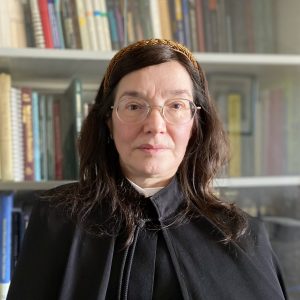 |
Filomena Botelho – Full Professor, Institute of Biophysics, Faculty of Medicine, iCBR, University of Coimbra, Coimbra, Portugal |
Scientific Co-coordinators
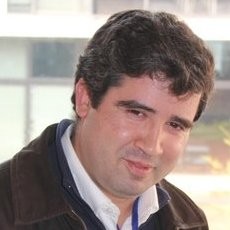 |
Francisco Caramelo – Assistant Professor, Faculty of Medicine, University of Coimbra, Coimbra, Portugal |
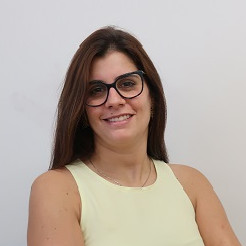 |
Margarida Abrantes – Assistant Professor, Faculty of Medicine, University of Coimbra, Coimbra, Portugal |
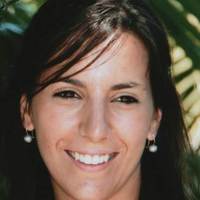 |
Salomé Pires – Invited Assistant Professor, Faculty of Medicine, University of Coimbra, Coimbra, Portugal |

